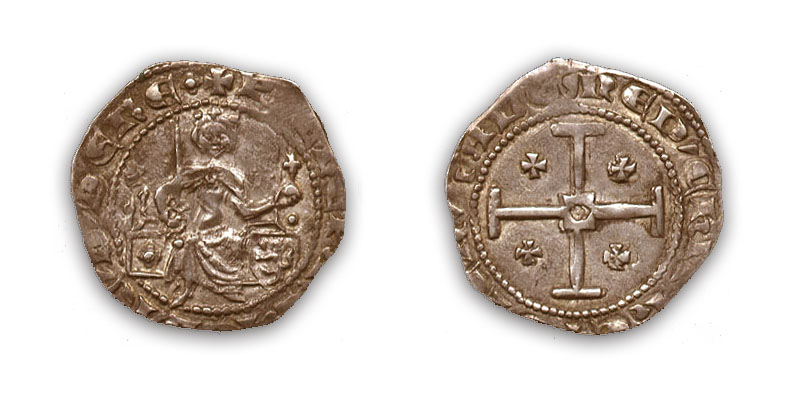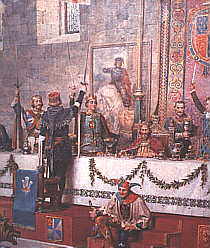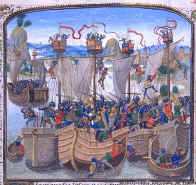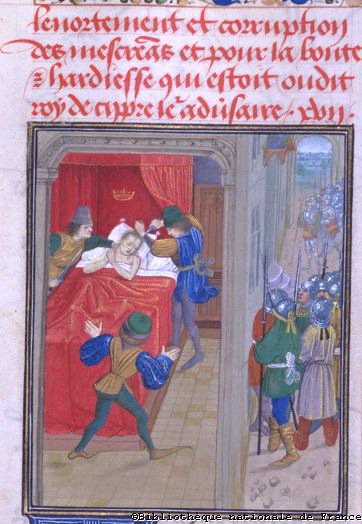 Immediately on his accession the Armenians appealed Pierre
for aid. The kingdom of Armenia existed by this time only in name. The country was
occupied by the Turks except for a few fortified towns on the coast, and the king of
Armenia had gone to Europe to appeal in vain for help. King Pierre I immediately
responded, and in 1361 sent to Courico, which was being invested by the Turks, two galleys
with reinforcements, arms and provisions. The occupation of Courico was designed to afford
the merchants of Cyprus a secure position on the coast from which to carry on trade with
Asia Minor, and also to provide a military base for further conquests on the mainland.
Meanwhile, the king made preparations for a descent on Asia Minor. He assembled all the
knights in his service and collected a fleet of hundred ships in the port of Famagusta.
His object was Adalia, capital of the sanjak of Tekke-ili and one of the strongest
fortresses of the Turks in Asia Minor. The Cypriot forces disembarked close to Adalia, and
at dawn next day took by assault the fortress deemed to be impregnable. Hearing of this
success, the emir of Lajazzo and the lord of Candalor sent embassies to King Pierre
offering to pay an annual tribute and to acknowledge his possession of Courico and
Adalia. Immediately on his accession the Armenians appealed Pierre
for aid. The kingdom of Armenia existed by this time only in name. The country was
occupied by the Turks except for a few fortified towns on the coast, and the king of
Armenia had gone to Europe to appeal in vain for help. King Pierre I immediately
responded, and in 1361 sent to Courico, which was being invested by the Turks, two galleys
with reinforcements, arms and provisions. The occupation of Courico was designed to afford
the merchants of Cyprus a secure position on the coast from which to carry on trade with
Asia Minor, and also to provide a military base for further conquests on the mainland.
Meanwhile, the king made preparations for a descent on Asia Minor. He assembled all the
knights in his service and collected a fleet of hundred ships in the port of Famagusta.
His object was Adalia, capital of the sanjak of Tekke-ili and one of the strongest
fortresses of the Turks in Asia Minor. The Cypriot forces disembarked close to Adalia, and
at dawn next day took by assault the fortress deemed to be impregnable. Hearing of this
success, the emir of Lajazzo and the lord of Candalor sent embassies to King Pierre
offering to pay an annual tribute and to acknowledge his possession of Courico and
Adalia.On the return of the king to Cyprus, the Turkish
sultan, Tacca, invested Adalia with considerable forces and, throughout the winter, when
the supply of food and munitions by sea was difficult, the Cypriot garrison had great
difficulty in repelling the repeated attacks of the Turks. In the spring a successful
sortie was made on the Turkish camp, which was taken and burnt. At the same time the
admiral of Cyprus after revictualling Adalia, made a descent on Myra and sacked that city.
Among the spoil the icon of St. Nicholas was taken by the admiral and transferred to the
cathedral at Famagusta. These successes, however brilliantly they might be, could not be
secured against the power of the Turks without the employment of larger forces than Cyprus
could provide. For this reason, King Pierre I left Cyprus for Europe in 1362 in the hope
of obtaining support for a new crusade. But a fatal chain of circumstances delayed him in
Europe for nearly three years. The jealousy of the Venetians and the Genoese, now in
agreement, was aroused by the successes of the Lusignan king, and they hindered the
efforts of his officers to equip fleets for a war which would bring ruin to their trade.
On the other hand, the English wars in France and the indifference of the German emperor
prevented the Western Powers from giving support to a cause which was becoming more
outside the sphere of their interests.
 |
|
Feast held in London in honour of the King of Cyprus
Pierre I Also present were the Kings of England, Scotland, France and
Denmark
|
Nevertheless in France and England, in Flanders, Poland
and Hungary, the king of Cyprus was received everywhere with feasting and tournaments, in
all of which he played a brilliant part. The Pope received him at Avignon and promised to
preach a new crusade of which King John of France was to be the leader. But, King John
died in 1364 and Pierre was left to collect volunteers as best he could. Meanwhile, the
Turks had not been idle. Adalia was invested by land and sea, and was with difficulty held
against the assaults of Tacca. In 1363 Cyprus itself was in serious danger. While the
southern part of the island was subject to an epidemic of fever, the Turks raided the
northern coast towns, from Kormatiki to the Carpass, except the fortress of Kyrenia. In
1364 the emir of Damascus, who had hitherto been friendly, sent threatening letters to
Cyprus, and the prince of Antioch, who was regent in the absence of his brother, the king,
forwarded the letters to Europe as an indication of the growing hostility in the East.
King Pierre showed these letters to the Pope, and the indignation they aroused in the West
helped to bring volunteers to the supports of the king. Finally, in June 1365, King
Pierre, with a force small in number but composed of veteran soldiers, set sail from
Venice in the galleys chartered by his chancellor, Philippe de Maizieres.
King Pierre sailed direct for Rhodes, and the Cypriot
fleet of a hundred ships joined him there in August. This concentration of force, directed
apparently against Asia Minor, caused several of the emirs of Ionia to seek alliance with
the king of Cyprus, and with them, in return for an annual tribute, the king made treaties
of peace. Then, in alliance with the Hospitallers, he for the first time disclosed his
plan of campaign and steered for Egypt to attack the Moslems at the centre of their power.
The attack was unexpected, and after a hard battle in which he bore himself always in the
thickest of the fight, the king captured the great city of Alexandria. It was a brilliant
but a fatal success. The knights of Eurpoe, who had fought well in action, faltered on
seeing the forces which barred the way to Cairo, and feared to attempt what St. Louis of
France had failed to accomplish in 1244. King Pierre, by their refusal to follow him
further, was obliged to evacuate the city after three days pillage, and to return to
Cyprus.
|

|
|
The Cypriot
admiral attacked
Turkish fleet off the Cilician coast
and captured or burnt their ships. |
The sultan, furious at the shame and the loss he had
suffered, took reprisals against the Christian merchants in Egypt and Syria, whom he
arrested and deprived of all their property. The Venetians alone, whose share in the
expedition remained obscure, managed to preserve their interests and were the first to
profit by the withdrawal of the allied forces, by renewing commercial relations with the
sultan. The capture of Alexandria by King Pierre had but a temporary effect in the west.
The Pope, Urban V, sent messages of congratulation and exhorted the princes of Europe to
go to the aid of this -valorous king of Cyprus and intrepid champion of Christendom-. But
few knights responded to the call. The kings of Europe remained intent on their own
affairs, and the Pope was constrained to give way to the demands of the maritime cities
and to advise King Pierre to make peace with Egypt. The king, seeing that he could expect
no further help from Europe, gave way to the wishes of the Pope and authorised the
Venetians to open negotiations for peace. Meanwhile, he marshalled his forces against the
Turks of Asia Minor, who had prepared a fleet to be sent in support of Egypt. The Cypriot
admiral attacked this fleet off the Cilician coast and captured or burnt the Turkish
ships.
The following year the Grand Caraman himself, the Turkish
ruler of Caramania, at the instigation of the Egyptians advanced with all his forces to
attack Courico. The Moslems hoped by this diversion to force the king of Cyprus to agree
to the terms of peace demanded by the sultan. The king, unwilling to leave Cyprus
undefended until peace with Egypt was concluded, sent his brother, the Prince of Antioch,
to reinforce Courico. Immediately on landing with his leading troops, the prince attempted
a surprise attack on the Turkish camp, but becoming aware of their immense superiority in
numbers, he withdrew to the castle to wait for the remainder of his forces. A second
attack having been repulsed by the overwhelming numbers of the Turks, the prince realised
that he must wait for further reinforcements. After a week of inactivity on both sides,
the Turks, hearing of a Mameluke revolution in Cairo, decided to retire behind the Taurus
to await developments in Egypt. The prince, being informed by spies of the intended
retirement, seized the opportunity of attacking the Turks during their preparations for
retreat. Directing his forces in three converging divisions, he advanced against the
Turkish position. Their retreat became a rout and a massacre. The Turkish camp with all
its arms, munitions, and treasure, was captured, and Grand Caraman sent envoys to sue to
peace. A treaty was soon concluded, and the town of Courico was repopulated by merchants
from Cyprus and commercial relations were established with the Turks.
The negotiations with Egypt for a treaty, to include the
recognition of Cypriot consulates and the reduction of customs duties in the ports of the
Levant, were being delayed, and, in order to enforce his terms, King Pierre decided to
resume hostilities before the Western knights should have completed their terms of
service. Realising that an attack on Egypt was now out of the question, he sailed to
Syria, where he captured and pillaged Tripoli and other towns. In 1368, with a view to
resuming war with Egypt, the king again left Cyprus to ask to levy a new war tithe in
Europe and to enroll fresh troops. But he was soon convinced that a new crusade was no
longer possible. The Pope was unable to give him support and advised him to make peace at
once with Egypt. King Pierre, seeing himself left with the Hospitallers alone in the
attempt to re-establish the kingdom of Jerusalem, the dream of his whole life, consented
to allow an embassy to treat with the sultan in the name of himself, the Pope and the
Italian republics, whose commerce had been ruined by the war. A truce was quickly arranged
which ended hostilities and led to the signing of the treaty which had been under
discussion for two years.
 While in Rome, King Pierre received a
deputation from the Armenian chiefs imploring him to become their king and to restore
their fallen fortunes. The king returned to Cyprus hoping to find among his knights
sufficient forces to succour the Armenians and to prevent the total loss of the last
outpost of Christendom in Asia. But, hardly he landed in Cyprus than the king was
overwhelmed by domestic troubles. The queen, Eleanor of Aragon, whom he had left in Cyprus
during his long visits to the West, had proved faithless. The king retaliated on the
nobles who had been her favourites and behaved with such haughtiness and tyranny that he
alienated the sympathy of his barons and even of his brothers. In January 1369 he was
assassinated by a body of nobles with the concurrence of his brothers. His son Pierre, a
boy of thirteen, succeeded to the throne under the regency of his uncles, Jean, prince of
Antioch, and Jacques, constable of Cyprus. While in Rome, King Pierre received a
deputation from the Armenian chiefs imploring him to become their king and to restore
their fallen fortunes. The king returned to Cyprus hoping to find among his knights
sufficient forces to succour the Armenians and to prevent the total loss of the last
outpost of Christendom in Asia. But, hardly he landed in Cyprus than the king was
overwhelmed by domestic troubles. The queen, Eleanor of Aragon, whom he had left in Cyprus
during his long visits to the West, had proved faithless. The king retaliated on the
nobles who had been her favourites and behaved with such haughtiness and tyranny that he
alienated the sympathy of his barons and even of his brothers. In January 1369 he was
assassinated by a body of nobles with the concurrence of his brothers. His son Pierre, a
boy of thirteen, succeeded to the throne under the regency of his uncles, Jean, prince of
Antioch, and Jacques, constable of Cyprus.
|